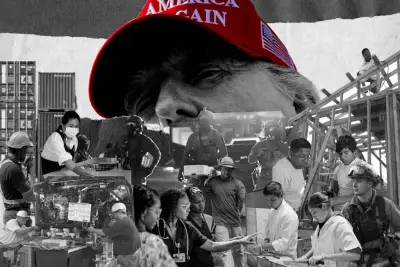Trump’s policies are adding up to a hostile work environment

This article was produced by Capital Main It is published here with permission In California crops have gone unharvested as farmworkers stay home out of fear of immigration raids Internal Revenue Function workers in Kansas City have identified themselves jockeying over desks after remote workers were abruptly ordered back to the office Tariffs are putting the brakes on hiring President Donald Trump won a second term with a promise to assistance the working-class voters who backed him But multiple workers now feel less secure and find their jobs harder to do squeezed by immigration crackdowns federal layoffs and funding cuts and weakened labor protections The uncertainty fueled by these policies combined with Trump s bargain wars is beginning to surface in economic information economists say The July jobs description which demonstrated the country had undergone the weakest three months of job development since the pandemic was so alarming to Trump that he took the unprecedented step of firing the head of the Bureau of Labor Statistics the agency that compiled and published the statistics Harry Holzer a Georgetown economist and senior fellow at the Brookings Institution think tank explained the difference between this day s uncertainty and past episodes such as the COVID- pandemic and the housing crash is that this one is self-inflicted All of this uncertainty has been created by Donald Trump and his fairly erratic economic policies Holzer reported Trump s slash-and-burn tactics have fallen hardest on federal workers facing firings hiring freezes and deferred-resignation programs and on immigrants threatened by the administration s intensified arrest and deportation efforts But economists workers and labor advocates say the effects have rippled beyond those groups From restaurants to factories to physical condition care clinics business owners and workers are operating in an habitat of increasing uncertainty and fear The Trump administration for its part describes his approach to the financial sector as one that is prioritizing American workers who have been undermined by illegal labor and bad commerce deals that shipped jobs overseas White House spokesperson Taylor Rogers declared in an email adding The President s immigration enforcement efforts and bargain deals have encouraged businesses to hire American workers at higher wages Yet the number of jobs added in the manufacturing sector has fallen for three straight months And for particular workers the turbulent first eight months of the Trump administration have meant doing more with less Wildland firefighters are now staffing ranger stations to compensate for cuts in the U S Forest Organization even as fire season enters its peak At a Kraft Heinz plant in Michigan that makes pickles mustard and barbecue sauce employees are working long hours after the Trump administration revoked the work visas of a half-dozen of their immigrant coworkers And various workers are doing nothing at all More than federal employees including large numbers at the Treasury Agriculture and Defense departments are in the present being paid to stay home a practice that will end in late September when their paychecks stop under a Trump administration plan to thin the leadership workforce Various industries are especially vulnerable to the disruption caused by Trump s policies Construction sites which depend heavily on immigrant labor are operating with fewer hands reported George Carrillo who leads the Hispanic Construction Council a Washington D C -based approach and advocacy group The shortage has nudged wages higher for those who remain but it also has slowed projects and increased safety risks he declared In construction You can t afford to get hurt and you have to work through the pain The administration s move to rescind the legal status of more than a million immigrants from countries that have experienced political turmoil or natural disasters is expected to cause further disruptions in construction hospitality food transportation vitality care and other industries reliant on immigrant labor After the release of the dismal July jobs summary Labor Secretary Lori Chavez-DeRemer tried to shift society attention toward the supposed job gains made by U S -born workers Wages continue to rise and native-born workers have accounted for all job gains since Inauguration Day she revealed in a announcement But her assertion about U S -born workers was a misreading of the jobs account according to economists interviewed by The Washington Post It is not clear that U S -born workers have reason to celebrate The research shows very clearly that when you deport immigrant workers native-born workers lose jobs as well mentioned David Cooper director of state agenda and research at the Washington-based Economic Strategy Institute a think tank affiliated with the labor movement And the Economic Agenda Institute document predicts that Trump s mass deportation effort if implemented could eventually cost U S -born workers million jobs with the biggest disruptions expected in Florida Texas and California states heavily reliant on immigrant labor That s because the hiring of immigrant workers helps promotion job creation for native-born workers Cooper announced In the face of this uncertainty workers also have fewer protections as the administration moves to weaken the very agencies tasked with safeguarding them The Equal Employment Opportunity Commission which enforces laws against workplace discrimination has lost its quorum due to firings and has been repurposed to focus on the administration s anti-DEI agenda The Trump administration slashed more than of the National Institute for Occupational Safety and Robustness s budget eliminating its organization that tracked and sought to prevent heat-related deaths among farm and construction workers Another example Trump s removal of Gwynne Wilcox from the National Labor Relations Board which oversees private-sector union organizing The firing deprived the board of a quorum and marked the first time in the board s history that a sitting member had been dismissed That move empowers employers seeking to quash unionization drives announced AFL-CIO advocacy director Jody Calemine If an employer wants to delay justice all they have to do right now is appeal any of the decisions up to the full board which cannot issue a decision So even the preponderance fruitless appeals can frustrate workers attempts to form a union Calemine mentioned Through executive order Trump has also moved to strip nearly a million federal workers of collective bargaining rights and earlier this month a federal appeals court allowed the administration to proceed with the order as the litigation over it unfolds In early August more than Department of Veterans Affairs employees lost bargaining rights as part of what Calemine described as the single biggest act of union busting in American history Still the Trump administration has painted a rosy picture of how workers are doing now and how they will fare in the future Thanks to President Trump s bold America First agenda fair deal deals and the One Big Beautiful Bill Act are poised to further strengthen the American workforce Chavez-DeRemer commented in her report Economists and labor advocates worry about the cost of Trump s tariff policies to workers pocketbooks Even supporters of targeted tariffs on industries like auto and steel manufacturing question how much Trump s chaotic approach to making pact deals will ultimately help workers given the environment of uncertainty it fosters And that s not the only predicament according to the AFL-CIO s Calemine Effective arrangement agenda requires domestic venture in key industries and strong global labor standards he announced but Trump has done the opposite signing his Big Beautiful Bill that cuts tax incentives for domestic clean strength projects and defunding the agency fighting exploitative labor practices abroad That measure also heavily favors the wealthy with of benefits going to the top of earners according to the Penn-Wharton budget model a nonpartisan research initiative The lowest-income households are expected to lose out due to cuts in benefits including Medicaid and SNAP This bill is a transfer of money from the poorest households in America to the richest households in America full stop Cooper with the Economic Agenda Institute disclosed The provision will also temporarily eliminate taxes on tips and overtime pay as a way to help workers UC Berkeley Labor Center economist Enrique Lopezlira revealed the benefits of those narrowly targeted tax breaks will likely be outweighed by the costs of Trump s other economic policies If the full effect of tariffs comes into place and if the labor territory indicators continue to show weakness and eventually more important downturn then I don t see how those future tax benefits will help workers right now or for the rest of the year Lopezlira commented The full impact of Trump s policies may take time to emerge For example the Medicaid cuts in the One Big Beautiful Bill Act that Trump signed on July while projected to lead to the loss of hundreds of thousands of healthcare care jobs won t go into effect until after the midterms That lingering uncertainty has labor experts and economists feeling pessimistic about what the future holds for American workers We are seeing a lot of Trump s policies come home to roost in the labor region in a bad way declared Calemine with the AFL-CIO Workers he added are less free than they were eight months ago and increasingly concerned about where our country is headed when it comes to our rights and our freedoms Capital Main is an award-winning nonprofit publication that reports from California on the majority pressing economic environmental and social issues of our time including economic inequality weather change robustness care threats to democracy hate and extremism and immigration Copyright Capital Main

